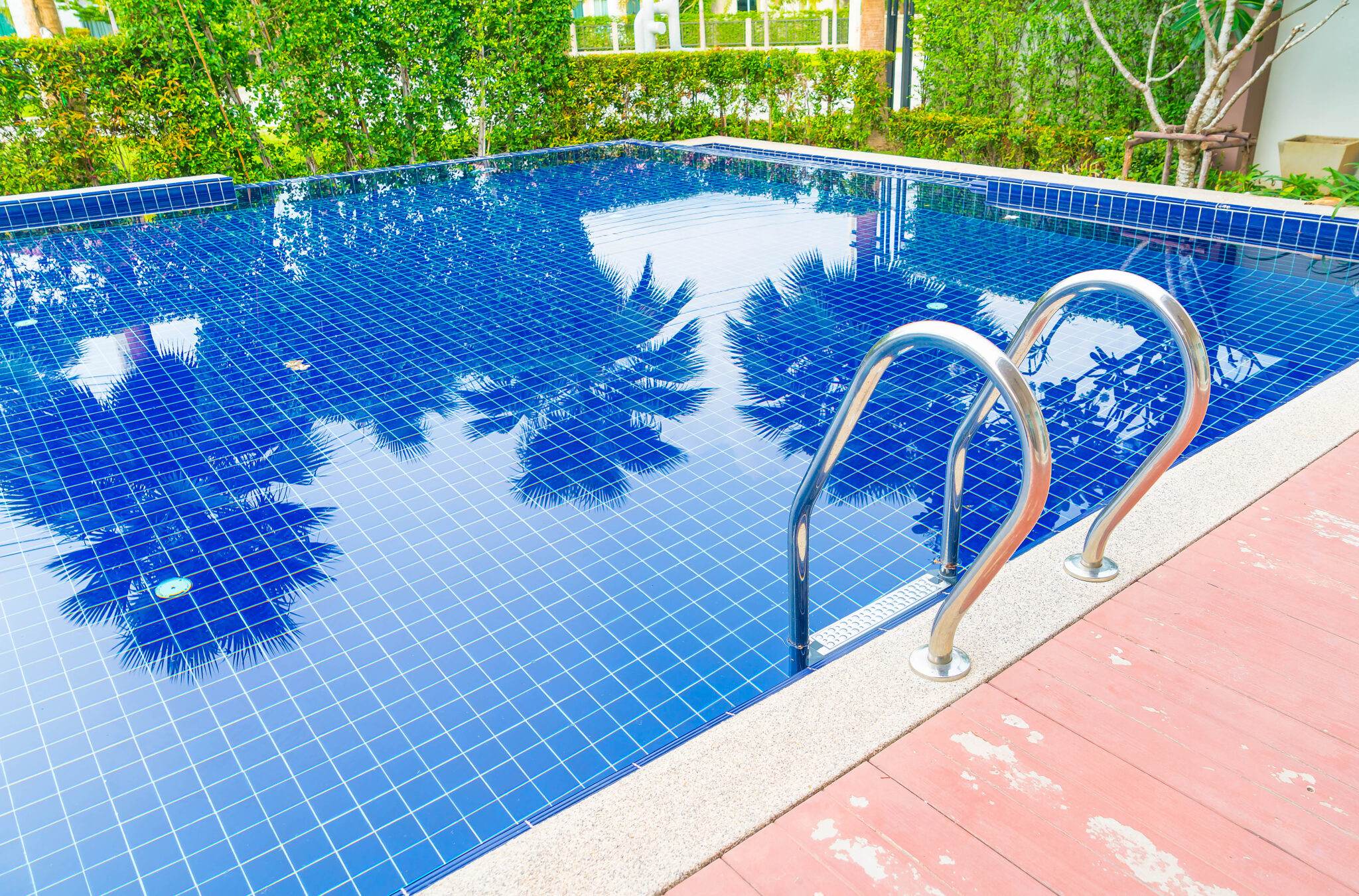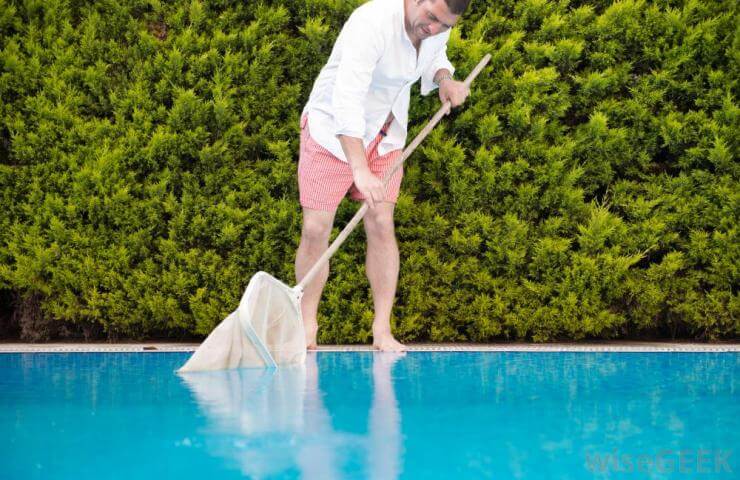Ok, so you dived in and got yourself a nice indoor swimming pool. Congrats. We bet that right now you’re standing next to it, scratching your head, thinking about what’s next.
No doubt, it looks inviting and cool, sparkly and brand spanking new. For now. However, if you’re committed to keeping it that way, maintenance is key. Let’s jump right in.
What maintenance does a pool require?
Regardless of where you live, how frequently you enjoy your pool, or how new you are to the pool game, maintenance is an important factor in having a healthy pool. It can consist of anything from you removing debris, balancing water chemistry, or maintaining the pool’s equipment.
Relax though, and think less Breaking Bad and more of a simple Yr7 chemistry class. Definitely doable.
Your pool requires attention. That’s right. You thought that with a new pool your weekends will be all about pool-side cocktails and frolicking, which they will be eventually, but maintenance for your swimming pool needs to be a priority.
We’ve compiled all the need-to-know pool-hacks to make maintaining your swimming pool easier even if you’re an ultimate beginner, no matter if you have an inground or above ground pool. And as a bonus, we’ve also listed the most common pool maintenance mistakes to avoid.

What are All the Pool Parts Called?
First thing first. Before you become the master of your own pool you really should understand its components. Pools are fairly simple to figure out, so it won’t take long to wrap your head around the ins and outs of your new expensive water toy.
1. The Pool’s Water
The pool’s water will require balancing; this is done through water treatment systems and water balancing chemistry. It might initially sound quite complicated, but that’s only natural when first understanding how to maintain your pool as a beginner.
The water must be balanced as it will help to maintain the pool structure itself and any additional equipment, such as pool ladders and the pool pump. Do yourself a favour and spend enough time on this, so you’ll save yourself some expensive grief later on.
2. The Pool’s Interior Wall or Liner
Pool liners can vary from one pool to another. Some pool liners are made of solid walls, whereas others have a lining sheet made of vinyl. No surprise here, how you care for your pool liner will depend on its type.
Pool liners need to be cared for, as although it might not appear that they do much apart from making the pool look inviting, they also help retain the pool’s water. Pool vinyl liners can be expected to last between 10 – 15 years, but many factors can affect their lifespan.
3. The Pool’s Filtration System
No doubt, the filtration system is one of the most vital parts of your pool. The filtration system works using a pump to push water through the skimmers and various other filters before returning the clean water to the pool itself.
The filtration pump is also used for various other deep-cleaning tasks, which is why it is crucial that you pay attention.
4. The Pool’s Cover
Pool covers are easily forgotten about, especially by beginners, but there’s a lot of value in them. You’ll find various different types of pool covers, including:
- Indoor covers
- Safety covers
- Winter pool covers
- Solar pool covers
- Automatic covers
Pool covers do more than keeping leaves and those pesky insects at bay; they can also help lock in heat, protect the chemicals in the water, and prevent people or animals from falling into the pool (that’s slightly drunk Uncle Paul every damn Christmas). Therefore, it pays to invest in a good swimming pool cover and roller.
Pool Maintenance Schedule
Brace yourself, this is a consistent activity. However, if you keep up with it, it will be a short and sweet task each week without a costly headache.
We listed your pool maintenance schedule below by weekly, monthly and annual tasks, so even as a beginner in pool maintenance, you can set your calendar and go to town.

Weekly pool maintenance tasks
- Check the water levels to ensure that the pump can work efficiently
- Test the water and adjust the pH if necessary
- Test the chlorine levels in the pool water
- Test and adjust the alkalinity
- Test oxidiser and stabiliser levels and adjust if needed
- Inspect the pool water and check for clarity and algae growth
- Remove any leaves or debris from the bottom of the pool, skimmer basket, and skim the surface of the water to remove debris
- Add the appropriate amounts of weekly chlorine or oxidise pool (you need to check the recommendations on the product)
- Check the filter pressure and backwash if necessary
- Depending on the products you use, you may need to shock the pool at least once every 2 weeks to eliminate contaminants and restore clarity to the water.
Monthly pool maintenance tasks
- Test and balance the pool water as needed
- Test the calcium hardness and adjust accordingly
- Test the total alkalinity
- Clean the filter
- Inspect equipment such as pump and filter for proper functioning
- If your pool has a liner, inspect the liner for holes and tears and make any necessary repairs
- If you have a concrete, gunite, or fibreglass pool, inspect for cracks
- Check all other pool equipment including ladders, handrails, diving boards, etc. to make sure nothing is loose and it is working properly (you better be ready for Uncle Paul after all)
Yearly pool maintenance tasks
Some tasks you will only need to complete once a year. However, this doesn’t mean that these aren’t just as important as your daily and weekly jobs. By keeping on top of these, you can save yourself from having to pay for major repairs in the future.
- Deep cleaning pool filters with chemicals. This will depend on what type of filter you use, so you need to check with the professionals (and that would be us, of course)
- conduct checks of your pool’s hardware to ensure nothing’s out of place
- Inspect the pump and filter system to make sure there aren’t any cracks that could cause issues
- lubricate the O-rings of your pump and filter systems (such as in the push/pull valve) with a specialist pool lubricant to make sure nothing gets stuck over time.
Should you leave your pool pump on all the time?
To sum it all up before you run away to live in the woods without a pool in sight, you need to pay attention to the Three Cs and maintain:
- Good Circulation
So run the pump regularly – around 10 hours a day when in use and a few hours daily out of use, keep the filter clean and keep the water clean and balanced. - Regular Cleaning
By backwashing your filter regularly and getting a pool vacuum to clean the floor and walls - Balanced Chemicals
Your pool is kept bacteria-free by a sanitiser (usually either chlorine or bromine) that must be maintained. However, other chemicals support the sanitiser and protect the pool as it gets to work
How often should you put chlorine in your pool?
If you’re a strong reader, you will easily deduce it at this point, whenever the water testing results will tell you so. While it is unrealistic to think that most people will test their pool on a daily basis, under normal circumstances you will be adding chlorine to the water weekly.
Here’s a nifty little list for you for pool water maintenance:
- Sanitiser – usually chlorine or bromine
- Shock treatment – concentrated sanitiser for deep cleaning
- pH increaser/decreaser – also known as pH plus or minus
- Alkalinity increasers – also known as TA Plus
- Calcium chloride – used to adjust the calcium hardness of the pool
- Chlorine stabiliser (optional) – can protect chlorine levels if the pool is exposed to excessive sunlight.
Is it expensive to maintain a swimming pool?
It seems to be everyone’s favourite question, rightfully so. According to HiPages, maintaining a swimming pool in Australia can cost anywhere from $1,000 to $1,400 a year, so breaking that down to a monthly average cost, it will set you back around 100 bucks each month.
Pool maintenance cost can include:
- Pool pump cost – $80-$110 per month
- Pool heating cost – $100-$1500 per year
- Pool cleaning cost – $50-$1000 depending on the job
Of course, the cost can be significantly higher, especially if you skip regular maintenance. Also, maintenance costs in the summer are higher than in winter but usually that tends to even out.
Common pool maintenance mistakes
Now that you read through the pool maintenance for ultimate beginners, it’s time to highlight a few common mistakes to avoid, so you can really be the king of your own backyard.
Mistake #1: Draining your water
Draining your vinyl liner pool may seem like a good idea when opening it for the summer, however, you can do all the cleaning and maintenance necessary with the water still inside.
Draining a vinyl liner swimming pool can cause the liner to dry out or shrink. This would cause far more headaches than solutions and typically results in needing to replace the liner. Ouch. So, avoid draining your pool more than one-third of the time.
Mistake #2: Not monitoring throughout the season
So, summer is coming and you took all the necessary steps to prepare your pool for summer… Except you haven’t tested your water in two months. Say what?
Unfortunately, water testing is an integral part of pool maintenance and must be done at least once a week; if your pool is used nearly every day, you should check the water twice a week.
Keeping your pool water maintained with regular water tests will ensure clean, clear water all season long.
Mistake #3: Turning off your pump
When your pump is off, the pool can become a breeding ground for bacteria growth. Eeww.
When your pump is running and water is flowing, your filter is able to do its job and water is not allowed to settle which helps keep bacteria from growing.
Sunlight assists bacteria in growing, so especially in the hot summer sun (hello Queensland), it is very important to keep the water flowing to ensure bacteria does not have a chance to grow.
Leave the pump on for 7 to 8 hours per day (during the daytime) and closely monitor the water to be sure bacteria isn’t growing and that water levels are remaining the same. If there are issues with imbalances, return to a 24-hour pump schedule to be sure the water stays clean.
To scoop this up
Pool maintenance may seem daunting at first but with regular checks and equipment you will quickly graduate from a beginner to a swimming pool pro in no time.
In any case, make sure you do your research, and get in touch with the professionals, to get you going. If in doubt contact us, and we will help you out whatever trouble you’re in (but soz, no help with Uncle Paul, he’s yours to keep).






